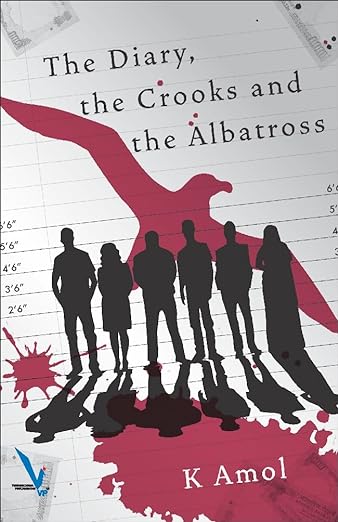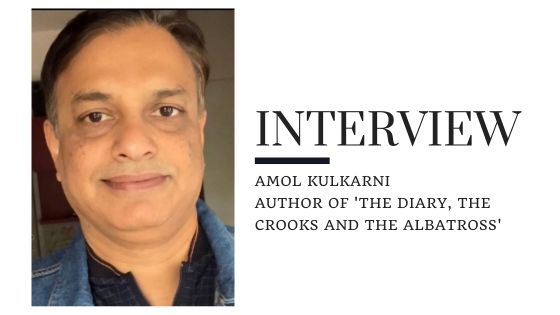About Amol Kulkarni
Amol Kulkarni, is an engineer by education. He is currently working as an IT professional in an MNC. He has managed to pursue his hobby of writing stories while working. Conceptualizing stories is his favorite pastime, and converting them into books is his ultimate goal.
He loves the fictional world of books and movies. The story telling mediums like books and movies fascinates him and he has a strong desire to be part of it. The ideas envisioned in his mind blends real life experiences with imagination and are deftly handled making them more realistic. He is interested in reading thrillers, mysteries and edge of the seat dramas, and the same is reflected in his writing.
The idea of writing a book came to him around 12 years back, and executing that idea took 4 more years when his first book, ‘He Lost His Mobile And…’, got published.
‘He Lost His Mobile And…’ is about the chaos the main protagonist goes through when he loses his mobile phone. In the next 24 hours, it not only creates chaos in his life, but also in the lives of his near ones and many others not even remotely related to him, including criminals, thugs and some powerful people in the city. How he navigates through the chaos to bring back his and his near ones life to normalcy makes the story.
He then tied up with First Forays agency, and his interest in writing got a boost.
His second and the latest book, ‘The Diary, the Crooks and the Albatross’, got published in Sep 2023.
He has also written some articles on social issues, like environment and road rage, which got published in ‘The Times of India’ recently.
LiFT: Tell us about your book, the journey of writing it and its content.
Amol Kulkarni: ‘The Diary the Crooks and the Albatross’ tells the story of investigation into Shivika’s death. A mysterious death at the peak of demonetization did not ruffle the police or the authorities, until one man – capable enough, curious enough, and intelligent enough – enters to uncover the truth about Shivika’s death, exactly one year from the day she fell dead.
The story reveals through her diary, how a game that was thrown at her, an ordinary computer engineer with a flair for hacking, comes to life before people who might also be suspects in the case of her death. The diary reveals how each character in her life played with her emotions and how she kept herself sane and countered them with her intelligence. The story is also about the investigator who – with no clues or evidence – cracks the seemingly impossible case of Shivika’s death by putting together psychological, technological and circumstantial evidence.
I had this concept in my mind about the death of a character shrouded in mystery with no clue or evidence if it was an accident, suicide, or murder. I started writing the book with this one-line concept. And on the top of it, I knew that if the characters have flaws, then the mystery becomes more intriguing. With this in mind, I created all the characters in this book (including the main protagonist) with a dash of imperfection, which made them believable and realistic on one hand and weird and enigmatic on the other.
I believe that even if your story or plot is ordinary, it’s the depth and intrigue of your characters that make it extraordinary.
The political and ideological divide among people, their bigotry and intolerance to other’s views, is a common trait in people across the world today. I tried to include these traits in my characters. The flaws and intolerance of the characters in this story impacts their relationship with the main protagonist which makes each one of them a suspect.
Once the characters were defined, I was looking for a backdrop for this chaotic setup, and the demonetization that was declared just when I started writing this book, which brought chaos in the lives of many, was the perfect backdrop for the chaos in my story too.
Once the characters, the backdrop and the plot were finalized, writing it for the book was not a big task.
LiFT: Why you chose this title?
Amol Kulkarni: According to the legend of the mariner in Samuel Taylor Coleridge’s 1798 poem ‘The Rime of the Ancient Mariner’, Albatross is sometimes used as a metaphor to refer to a burden, a source of frustration or guilt.
Guilt is a common trait in all the characters in this story, and therefore the metaphorical term ‘Albatross’ had to be in the title.
The diary is one of the important characters in this book. It reveals the true colors and shades of all the characters who came in the main protagonist’s life.
Also through her diary, it’s revealed that almost all the people close to her are no less that crooks.
And that made the title of this book, ‘The Diary, the Crooks and the Albatross’
LiFT: When did you realize that you want to be a writer and what’s your inspiration behind it?
Amol Kulkarni: I started thinking about plots and stories around 2010 when I realized that I could conceptualize interesting plots. I started writing short stories and scripts for short films. A couple of years later, I wrote a short story about what would happen in the life of a man if he lost his mobile phone. I saw a lot of potential for twists and interesting events that could be added to this story and I decided to write a full fletched novel on this concept.
The inspiration behind my writing is to showcase to the world the stories conceptualized in my mind. ‘What if it happened this way’ is a tagline that challenges every fiction writer who wants to create a fictional world around the real events, and it also has a dopamine effect on them.
LiFT: Where do you see yourself ten years down the line in the world of literature?
Amol Kulkarni: As of now I have 2 published books. In the next few years I would like to see my books adapted into movies or web-series. Ten years down the line I hope to have minimum 5 books published and adapted into movies/web-series.
LiFT: How much do you think marketing or quality of a book is necessary to promote a particular book and increase its readers?
Amol Kulkarni: Both marketing and quality of the book are important. Spending a lot of money on marketing may not result in readers recommending it to others, if the content is not good. On the other hand, if content is good but there are no efforts on marketing the book, then it will have a limited reach and readership. So quality or content is very important but marketing is equally important to promote a book.
LiFT: What is the message you want to spread among folks with your writings?
Amol Kulkarni: A fiction writer does not usually end up with a message through their book, but generally stimulates the mind of a reader with ‘Why’, ‘How’ and ‘What if’ questions. Eventually the message is through the characters built by the fiction writer when the reader ponders over it with lingering thoughts about the traits, behavior, and attitude of the characters and decides on what is good and what is not, what to imbibe and what not to.
LiFT: What do you do apart from writing?
Amol Kulkarni: I work as a full time IT professional working in an MNC and in fact it’s the writing that is my secondary activity. Writing for me is a hobby and a passion which I am able to sustain inspite of a demanding professional career in IT industry. Hopefully, once I retire after 7-8 years, I would be able to dedicate more time to writing.
LiFT: What are the activities you resort to when you face a writer’s block?
Amol Kulkarni: My experience says that whenever you are stuck, park it and move on to something else.
I experienced the writer’s block many times while writing. Usually there are subplots in most of the books, therefore my advice is whenever you are stuck, stop thinking about it and start writing on one of the subplots. This also draws attention to the importance of structure. If you have a broad structure of your story in place and chapters defined, then it’s easier to move to other chapters in case you are stuck with a writer’s block in one of the chapters.
Many a times, you get a solution to the writer’s block while doing some other activities, like exercising, listening to music or some other chores, so take a break when you face a writer’s block.
Sometimes, getting a writer’s block is good. It enables you to write some of the most mind-boggling twists because of overthinking.
LiFT: What if your story will be adopted as a movie? Whom would you want to work as a director or actors in it?
Amol Kulkarni: My ultimate aim is to get my books adapted as movies or web-series. If my book ‘The Diary, the Crooks and the Albatross’ gets adapted as a movie or web-series I would like to have it directed by anyone of these – Sriram Raghavan, Neeraj Pandey, Meghna Gulzar, or Reema Kagti.
I would like Alia Bhatt or Kiara Advani to play the main protagonist and Pankaj Tripathi, Rajat Kapoor, Abhay Deol, Rajkumar Rao as other characters.
LiFT: Are you working on your next book? If yes, please tell us something about it.
Amol Kulkarni: I am in conceptualization stage for my next book. I have 3 different plots / storyline ideas in my mind. One is a murder mystery/psychological thriller. Second one is a story about a clan who fight for their rights, set around 200 years in the past – in the early 19th century. The third one is set in future, around 150 years from now.
I plan to go with the third storyline idea for my next book, with the other two plot ideas to follow later.
LiFT: What are your suggestions to the budding writers/poets so that they could improve their writing skills?
Amol Kulkarni: My suggestions for aspiring fiction writers are –
Finalize the main plot first. You can add sub plots that merges with the main plot at some point. There are chances that while building the story, your main plot may drift from your original theme, but don’t worry about it as long as you stick to logic and reasoning. You may revisit and revise your main plot if there are substantial changes.
Another important thing to remember for mystery/thriller genre is to ensure that there are no lose or open ends. Everything that you opened in the earlier chapters should get closed at the end.
On discipline – be consistent on the rules you set for yourself. However, if you are not able to think about anything on a particular day, don’t force yourself just to meet the rule.
You can be a task master and set some deadline for completing a task, but at the same time you should be lenient with yourself if you are not able to meet them. Writing is an art, and art does not have any boundaries.
Click here to order Amol Kulkarni’s Book – The Diary, the Crooks and the Albatross


